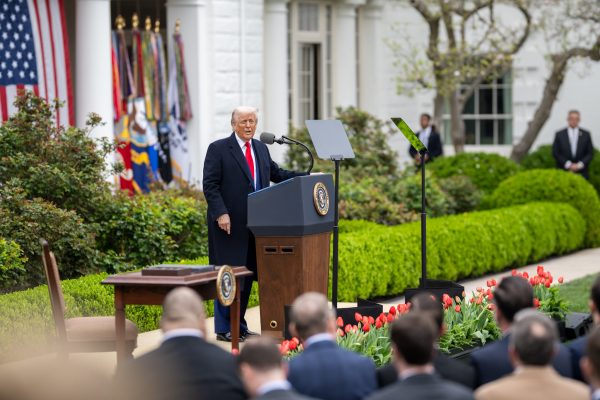Earlier this month, U.S. President Donald Trump signed an executive order to close the de minimis loophole (under which shipments valued at or below $800 avoid tariffs and taxes) for imports from China and Hong Kong. The change will officially take effect in early May. Not long after, in response to Beijing’s retaliatory tariffs (which were, in turn, a response to Trump’s “Liberation Day” tariff declaration), the White House moved to increase duty rates on this class of previously duty-free inbound shipments.
The de minimis exemption has been a topic of discussion for years among Americans concerned about China’s position vis-à-vis the United States. The Trump administration’s decision to take action in this regard will provide a major boost for the United States in three areas: manufacturing and job security, public health, and efforts to improve human rights in China.
China has benefited the most from this provision, with a 2023 House Select Committee on the Chinese Communist Party (CCP) report finding that Chinese e-commerce giants Shein and Temu alone account for 30 percent of all de minimis shipments into the United States. Chinese sellers on Amazon, which now comprise more than 50 percent of sellers on the e-commerce platform, have also taken advantage of this rule.
The U.S. is by far the largest market for Shein’s and Temu’s products. Ending the de minimis rule will practically upend both companies’ business models.
Trump’s executive order works to level the playing field for U.S. manufacturers and workers who have struggled to compete with the deluge of cheap Chinese products. For years, Chinese companies have gotten away with evading tariffs and profiting immensely – enriching the Chinese economy while putting American companies out of business. That’s especially galling considering that Beijing has never afforded U.S. products such lenient treatment.
Now, Chinese companies will be forced to play by the same rules as American companies when competing in the U.S. market.
Chinese companies have also used the de minimis exemption to avoid systematic inspections and risk assessment by U.S. Customs and Border Patrol (CBP). Packages of illicit drugs – including narcotics, fentanyl precursors, and drug paraphernalia – have masqueraded as packages containing benign, low-value goods. This comes at a time when the United States is in the middle of a fentanyl epidemic, with more than 70,000 fentanyl overdose deaths per year.
The Trump administration’s decision to end de minimis also protects American consumers from products containing harmful materials traditionally used for industrial purposes.
China is known for its frequent public health scandals and low consumer product safety standards. Notable incidents include the 2008 melamine milk scandal and the 2013 toxic school uniform scandal in Shanghai. Some clothing products from Shein and Temu were found to contain extremely high levels of cancer-causing carcinogens phthalate and formaldehyde as well as significant traces of lead – which can cause central nervous system damage and lead to death. Many of these deadly products target babies and toddlers.
But possibly most overlooked by the headlines is how an end to China’s de minimis exemptions is an important step toward holding the CCP accountable for its human rights violations.
The Uyghur Forced Labor Prevention Act (UFLPA) passed in 2021 prohibits companies from importing products tied to Uyghur forced labor and sanctions entities involved in this practice. There is evidence that Shein and Temu, for example, have supply chains that are linked to Uyghur forced labor, amid an ongoing genocide in the region – a reason why they should be added to the UFLPA entity list.
Due to the de minimis rule, however, companies have been able to circumvent this law, as their products do not require formal entry documentation. This poses a particular challenge to the enforcement of import bans on products.
Closing this loophole will make it harder for goods produced with Uyghur forced labor to enter U.S. markets by subjecting them to greater customs scrutiny – as required by the UFLPA along with Section 307 of the Tariff Act of 1930 more broadly, which prohibits the importation of items fully or partially produced using forced labor.
Despite the complex and often opaque nature of supply chains, additional steps can be taken to minimize the chances of importing products that violate U.S. forced labor laws. These include enhancing the tools at CBP’s disposal to allow for more efficient geographic targeting and ensuring that transshipment is addressed – a top concern of Trump administration officials.
It would also be essential to extend this executive order to apply to shipments originating in Macau – a special administrative region under increasingly tight CCP control, like Hong Kong, that has become a playground for China’s elite. It is an area known for its casinos as well as money laundering operations, prostitution, and triad activity.
Nevertheless, the Trump administration’s decision to close de minimis exemptions with regard to China is a necessary – and bold – first move aimed at protecting U.S. interests and human rights. It not only addresses an adversary’s predatory behavior toward U.S. businesses but also seeks to carve out a space for safe and slave labor-free products for Americans.
The weight now falls on Congress’s shoulders to codify this executive order concerning an issue that affects all Americans. There is no time to spare.


